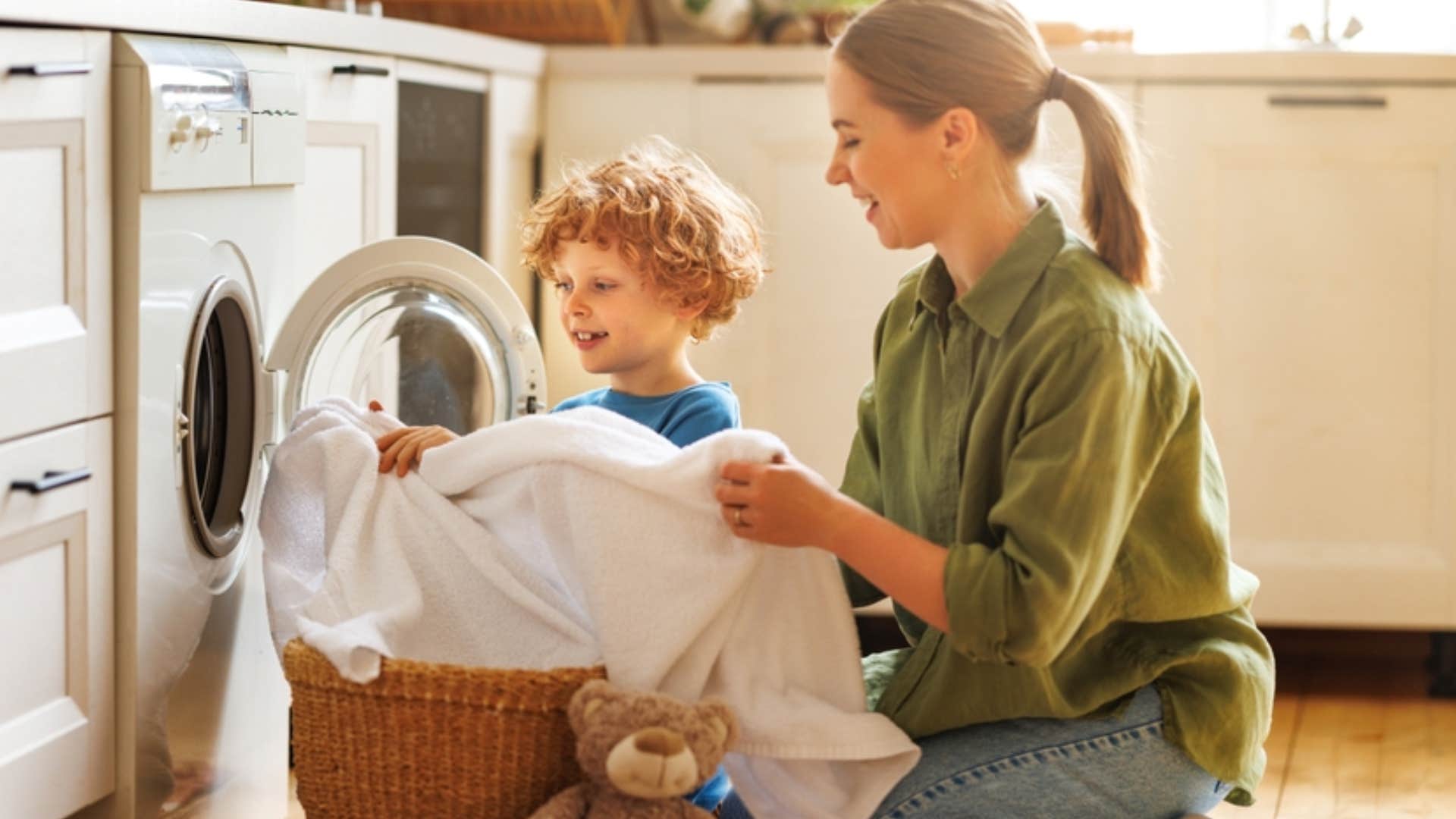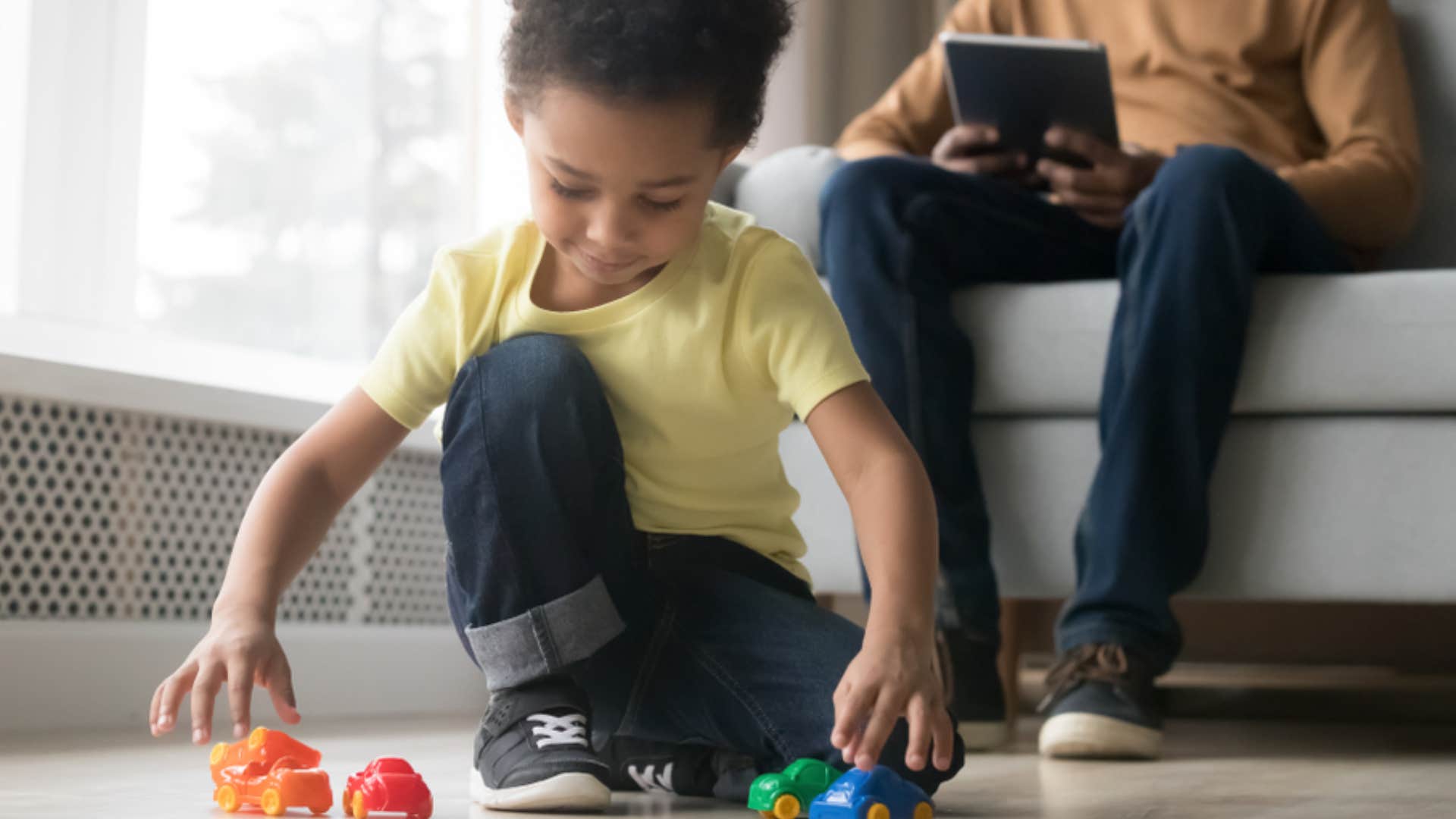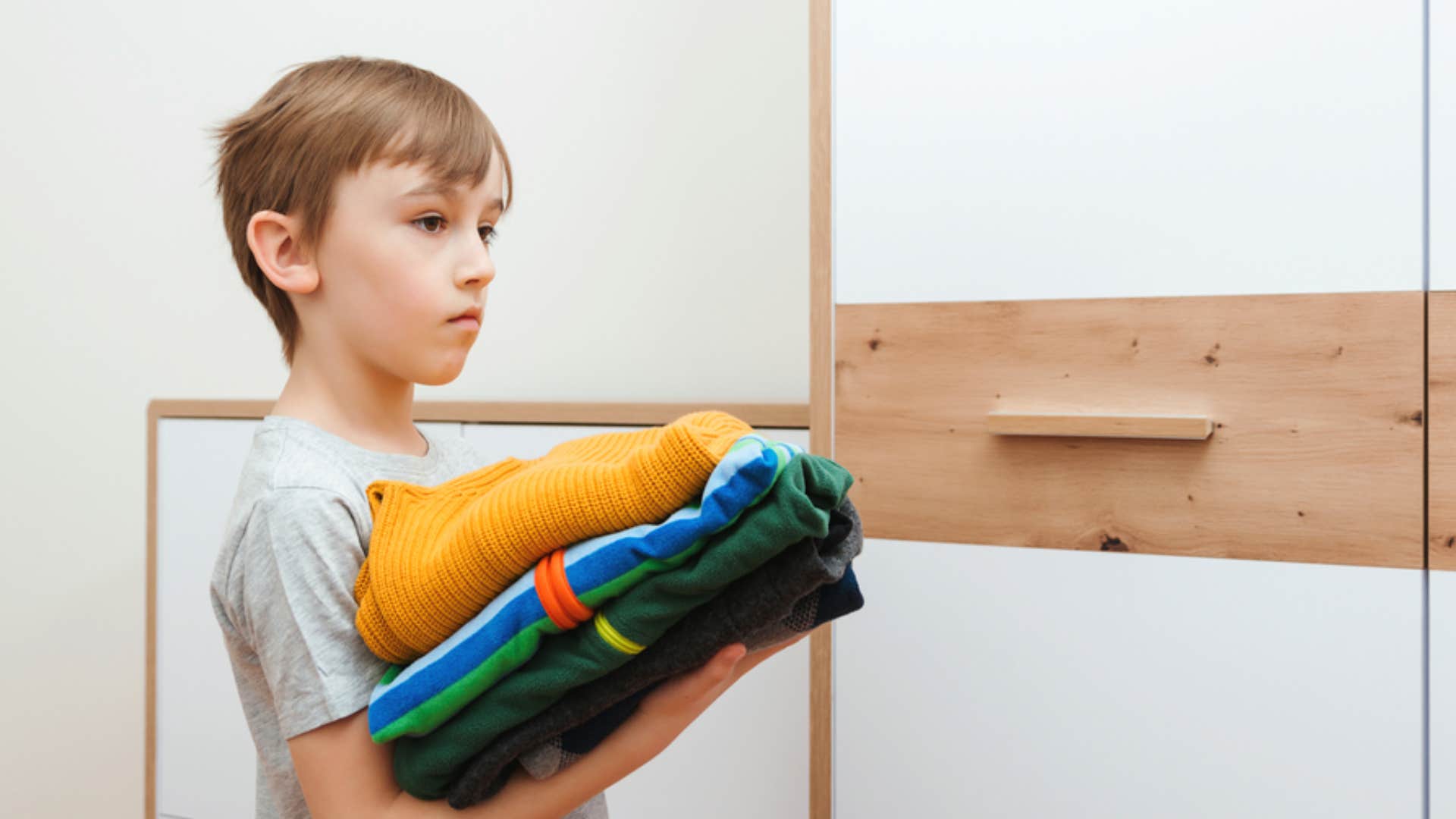If You Had These 11 Rules When You Were A Kid, Your Parents Weren't Strict, They Were Tired
Parents don't always enforce certain rules and expectations to be in control.
 BearFotos | Shutterstock
BearFotos | Shutterstock Raising kids is not for the weak — any parent knows that. Before people have kids, many envision the rules and expectations they will have for them, like never feeding them fast food or not allowing screen time. Having all of these rules is easy when there are no kids to follow them yet, but once they're here, parents may find themselves having to make course corrections.
Kids can be draining, and when parents are feeling exhausted, their ability to engage, reason, or compromise is limited, and they turn to rules as a quick solution to maintain order and minimize conflict. It's evident by the rules you had when you were a kid that meant your parents weren't strict, they were tired, and they really did mean well.
Here are 11 rules you had when you were a kid that meant your parents weren't strict, they were tired
1. You weren't allowed snacks after a certain time
 Evgeny Atamenenko | Shutterstock
Evgeny Atamenenko | Shutterstock
One of the rules you had when you were a kid that meant your parents weren't strict, they were tired was not being allowed to have snacks after a certain time, which was usually before or after dinner. This rule wasn't always the result of parental concern about your diet and metabolism; rather, it was likely a result of their exhaustion.
Some parents were so tired that they needed to set aside time for their own self-care and rest, and that often resulted in what kids would deem strictness. By creating rigid rules like this, parents could ensure they got the rest they needed to recharge for another day of parenting. Plus, research from the journal Eating Behaviors has shown that eating too late in the evening can disrupt sleep and cause behavioral issues.
2. You had limited screen time
 PeopleImages.com - Yuri A | Shutterstock
PeopleImages.com - Yuri A | Shutterstock
While screens can swoop in and save the day for exhausted parents by providing their kids with entertainment, it can just as easily turn into a back and forth screaming match when parents try to make them put the screens down.
Some parents opt to allow their children to have a strict limited window of when they are allowed to be on their screens, and make these expectations clear so it isn't a shock when they tell them to put them away. Cutting back on screen time has also been proven to make some kids calmer and more cooperative, which is what all exhausted parents need.
Studies, including one published in Paediatrics & Child Health, have shown that parents can positively influence children's social adaptive skills, sleep patterns and behaviors by being involved with and setting limits on their screen time.
3. You had to do your own laundry
 Evgeny Atamenenko | Shutterstock
Evgeny Atamenenko | Shutterstock
Laundry can quickly pile up in family homes, especially when the kids are involved in sports and end up with extremely dirty clothes, or they are notoriously messy. It can be a lot for already exhausted parents to keep up with additional loads of laundry that aren't even theirs, with someone else's clothes cycling through the washer and dryer each day before they are expected to be neatly folded.
Growing up, your parents may have implemented the rule that once you reached an age where you were able to learn how to operate a washer and dryer and to fold clothes, you were responsible for doing your own laundry.
This rule does more than take some of the household obligations off of exhausted parents' shoulders. According to curriculum creator and homeschooler Dachelle McVey, doing their own laundry teaches kids how to respect their belongings, responsibility, and gives them a sense of pride and independence.
4. You packed your own school lunch
 fizkes | Shutterstock
fizkes | Shutterstock
According to the U.S. Bureau of Labor Statistics, parents spend an average of 0.09 hours per day on activities related to their children's education. This totals to over 24 hours per year. A school-related task that takes up much of a parent's time that we often overlook is packing their kids' lunches.
After an entire day of scrambling to get them ready for school, getting them to and from school, helping them with homework and taking them to extracurricular activities, some parents just want their kids to be self-sufficient when it comes to this one responsibility.
But by having you pack your own lunch as a kid, it wasn't because your parents were strict, but because they were simply tired, and having you complete this task gave them a break while eliminating any potential fighting that could happen if they packed something you didn't like.
5. You weren't allowed to talk back
 VGstockstudio | Shutterstock
VGstockstudio | Shutterstock
Exhausted from answering every one of their children's questions and demands, parents may enforce a no talking back rule to reduce the amount of whining they have to hear, making it one of the rules you had when you were a kid that meant your parents weren't strict, they were tired.
Sometimes, parents simply do not have the energy to argue, and shut down any of their children's petty comments when they are attempting to defy the rules. Even though they may tell their kids that talking back is "rude," the truth is many parents are so burnt out and exhausted they do not have the stamina to explain each and every decision to their kids.
6. You had a curfew
 Prostock-studio | Shutterstock
Prostock-studio | Shutterstock
Curfews are not just for safety reasons. According to board certified pediatrician Dr. Karen Gill, "Setting a realistic curfew can help your... child stay safe at night, get enough sleep, and learn how to make responsible choices about how they spend their time," stressing the importance of communicating "when you expect them to arrive home each night" and creating "consequences for being late."
Parents are already exhausted after a long day, and want to ensure that all of their children are within the four walls of their home by a certain time so that they can sleep peacefully. While they certainly do not want anything bad to happen to their kids at all, when you were growing up, it would have been much worse if something happened to you as your parents slept if they never enforced a curfew to begin with.
7. You had to do your homework immediately after school
 Evgeny Atamenenko | Shutterstock
Evgeny Atamenenko | Shutterstock
To avoid constantly having to ask their kids if they've done their homework yet and fighting with them to get it done in the morning when they are both rushing and exhausted, some parents may implement the rule that all homework must be completed immediately or shortly after their kids get home from school.
This way, parents can also make themselves available to answer any questions instead of being asked as they are getting ready for bed in the evening. If this happened to you growing up, it wasn't because your parents were strict and wanted you to be under their control; rather, they were tired and needed you to finish your homework at a decent hour so they wouldn't have anything else to worry about.
Clinical experts from the Child Mind Institute indicate that parents should utilize a "homework planner" that will establish a steady homework routine that will work for both children and parents. But some parents resorted to "planning" a set time for homework for their kids.
8. You had quiet time everyday
 fizkes | Shutterstock
fizkes | Shutterstock
One of the essential rules you had when you were a kid that meant your parents weren't strict, they were tired was the implementation of "quiet time." To exhausted parents, there is nothing sweeter than the sound of silence. After dealing with chaos most of the day, parents may enforce mandatory "quiet time" for a certain period of time each day where their kids are required to entertain themselves however they want, as long as it's quiet.
Quiet time also allows children to recharge, giving them a break from constant stimulation. "Constant stimulation can be harmful in some ways," Laura Hlavaty, PhD, pediatric psychologist, shared. "Kids find it difficult to know what to do in unstructured times, especially when there are no screens. They struggle to sit still, relax and unwind, and parents feel a responsibility to entertain their kids when they're bored."
9. You couldn't have friends over during the week
 Inside Creative House | Shutterstock
Inside Creative House | Shutterstock
Weekdays can be filled with homework, extracurricular activities, and family responsibilities. That is enough for most exhausted parents to handle. While they may have no issue with hosting playdates on the weekends when there may be more free time, some of them are strictly against their children having friends over during the week since it will add to the chaos.
Just because your parents wouldn't let you have friends over during the week didn't mean they didn't want you socializing or forming connections. It was simply because they were tired, and setting rules like this prevented their parenting responsibilities from growing even more.
Parents already have enough to deal with when it comes to their own kids during busy weeks. They don't want to have to also worry about kids who aren't theirs.
10. You weren't allowed to ask for anything before a certain time in the morning
 christinarosepix | Shutterstock
christinarosepix | Shutterstock
The moment kids open their eyes in the morning, their requests immediately follow. They pepper their parents, who are still visibly sleeping, with "Can I have breakfast?" and "What are we going to do today?" And while providing meals and a routine are normal for parents, they may end up setting rules against asking questions before everyone has had enough time to adapt to the day so far.
For parents who depend on their beauty sleep, they may forbid their children from entering their rooms or asking for anything before a certain time. As a kid, it may have felt incredibly strict to be banned from your parents' room until later in the day, as children are used to their parents answering their questions immediately, but doing this gave your parents a reprieve to energize for the day ahead.
11. You had to keep all of your belongings in your bedroom
 Volurol | Shutterstock
Volurol | Shutterstock
Exhausted parents are already doing enough heavy lifting. They don't want to spend even more of their time picking up toys and other accessories that belong to their children. That's likely why the rules you had when you were a kid that meant your parents weren't strict, they were tired, included keeping personal belongings out of community areas, like the living room, kitchen, or bathroom.
According to professional organizer Regina Leeds, "Our ability to organize begins at a young age through the modeling and messages we receive from our parents. Being raised in a home where we weren't taught the skills to maintain order, we inadvertently may fall into the habits of disorder and unfortunately pass along these non-serving habits to our children, rendering them incapable of organization until they take it upon themselves to learn the essential organizational skills, to eliminate, categorize, and organize."
By enforcing a strict "keep your belongings in your own room" rule, your parents kept you organized and reduced the likelihood of having to constantly clean up after you. Luckily, this can instill in children the necessary boundaries to turn them into resilient adults in the future, which it hopefully did for you.
Megan Quinn is a staff writer with a bachelor's degree in English and a minor in Creative Writing. She covers news and lifestyle topics that focus on justice in the workplace, personal relationships, parenting debates, and the human experience.

